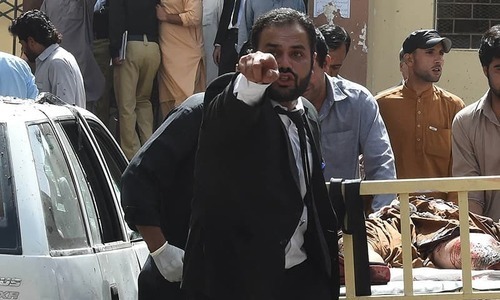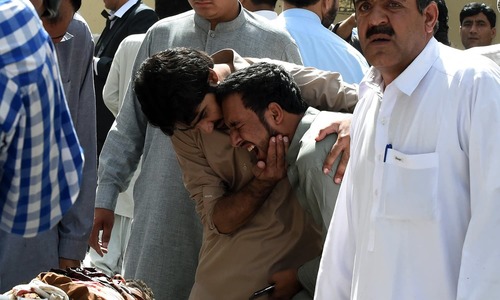
IF Pakistan has evidence that the Indian intelligence agency RAW acted in cahoots with its Afghan counterpart NDS to plan and execute the Quetta atrocity then the sooner New Delhi is confronted with this the better.
The offices of the national security advisers may be appropriate for this purpose as Pakistan’s Nasser Janjua, former corps commander in Quetta, is said to have developed an excellent rapport with India’s Ajit Doval, former head of RAW, over a cigarette break during one of their meetings in Bangkok when the two advisers stepped outside as their aides remained in the conference room. The two have been in regular contact since.
Although Pakistan has prepared a dossier reportedly chronicling Indian involvement in terrorist incidents in Pakistan and even presented this to the UN secretary general, nobody seems to have taken much notice of this damning evidence internationally.
You are right. I haven’t seen this dossier to ascertain if it is indeed damning but surely it must be. With its credibility already in question, the country would not submit anything other than an ironclad case against its rival to the UN secretary general.
So, while Pakistan raises the issue bilaterally with India and also at multilateral institutions in the hope that its efforts will bear fruit one day, should it not also focus on other areas so the challenge is addressed in a more holistic manner?
The situation is so critical that a multipronged effort to combat terrorism, and the underlying radicalisation which contributes to it, is imperative if we wish to give ourselves half a chance of overcoming what is often described as an existential threat.
While Pakistan raises its concerns about RAW’s alleged involvement in terrorism, it should also be looking at a more holistic solution.
One of the first steps that needs to be taken is to clearly tell the Afghan Taliban shura believed to be based in Quetta that unless its fighters decimate the camps of the Tehreek-i-Taliban Pakistan on Afghan soil where, security officials believe, all attacks on Pakistan originate, they will not be afforded the same level of protection as in the past. (This protection, too, should be contingent on their not using Pakistani territory to launch attacks inside Afghanistan.)
We hear often enough that the Afghan Taliban now control large swathes of territory inside their country and strike even Kabul at will. Since they have had many bases in Fata and the other side of the Durand Line, it is clear that they can take out Mullah Radio and his cronies if they do not consider them their allies.
In addition, the intelligence agencies must ensure that jihadist groups operating in the country cease their activities forthwith. Unfortunately, the state believes that organisations such as the Lashkar-e-Taiba (LeT), or Jamaatud Dawa as it is called now, Jaish-e-Mohammad (JeM) and the Sipah-i-Sahaba Pakistan, always act in the best interest of the country and are its second line of defence. It should be clear to the security apparatus that attempts at ‘mainstreaming’ such groups that claim to be patriotic, and inserting them in areas, such as Balochistan and parts of Sindh, where there is discontent among the population, will fail, even backfire, in the long term.
One need only turn the clock back a little over 10 years to remind the national security policy architects of the consequences of such a folly. It was a mere 10 to 12 years ago when the corps commanders of the Musharraf-led army were being garlanded as friends in Fata after concluding peace agreements with Taliban leaders.
Each of these leaders and groups would eventually turn on the state, necessitating military action which, in turn, would lead to the loss of several thousands of our valiant soldiers. In addition, this folly has caused thousands of casualties, in high five figures, of civilians whether they were praying in mosques, relaxing in parks, waiting at a bus stop, or studying in school. Neither were the politicians spared, nor did the intelligentsia get a respite as the merchants of terror ran amok.
All jihadist groups share an ideological affinity and it is generally a matter of time before they opt for the same path leading to their common goal. Pakistan cannot assume that one group is different from the other just because its actions are not hurting the country at a given point.
I have heard a security official expressing admiration for Jamaatud Dawa chief Hafiz Saeed and his activists because, according to him, they have so far played a monumental role in combating the militant Islamic State group in Pakistan.
This may well be true but fighting evil terrorist groups is not a task a sensible nation outsources to a proxy non-state entity. I say this knowing very well how patriotic our security services believe Hafiz Saeed and his followers to be.
But it is amazing how they forget that this very group mourned the killing of Osama bin Laden and still hail him as a hero; this when Bin Laden and his cohorts waged a war against the state of Pakistan and almost assassinated its military ruler.
LeT’s actions were also responsible for bringing the subcontinent almost to the point of a nuclear confrontation with their callous attack on civilians in Mumbai; a similar horror had been averted just years earlier when JeM attacked the Indian parliament in New Delhi.
If these acts were sanctioned by the state, God help us. But I believe that Pakistan was equally taken aback by these attacks especially since it didn’t seem to have a contingency plan in place to deal with possible repercussions.
Can we afford to just blame India and sit back and relax? I think not. We have to take the jihadi bull by the horns and defeat radical thought in order to root out terrorism. I would only be optimistic if there were signs of this happening.
The writer is a former editor of Dawn.
Published in Dawn, August 13th, 2016














































